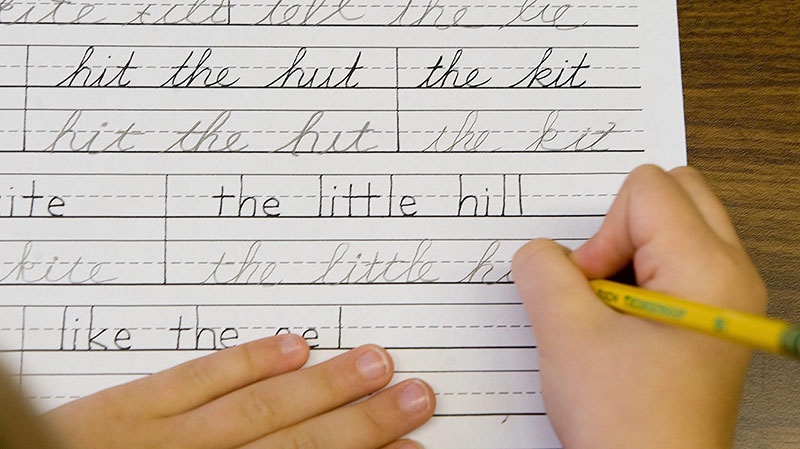Ontario is overhauling its language curriculum. Here's what's changed
Ontario students will begin learning from a new language curriculum in September 2023.
The changes to English and French language courses come as the province continues to de-stream Grade 9 and will impact students starting in Grade 1.
The Minister of Education said the changes were inspired by the Ontario Human Rights Commission Right to Read report and focuses on “time-tested practices” such as phonics, cursive writing, digital literacy and critical thinking skills.
“We have a third of children graduating high school not at the reading comprehension levels for grade 12,” Minister Stephen Lecce told CTV News Toronto. “We need our young people to master the fundamentals. They need to be fluent in literacy, in math, and those skill sets that really matter.”
- Download our app to get local alerts on your device
- Get the latest local updates right to your inbox
The “massive overhaul” of the English and French language curriculums introduces a new strand structure involving foundational reading and writing, digital literacy and connections to diverse voices. Students in senior kindergarten to Grade 2 will also be screened regularly using an evaluation-based system to determine their knowledge compared to provincial averages.
“This is a way by which we're going to measure province wide, how kids are doing and the youngest grades, and then allow parents to know the result,” Lecce said.
Report cards will also change in September. Students will be given one mark for language instead of separate marks for each learning strand.
Here is the breakdown of some of the skills students will learn in each grade.
Grade 1
Students will learn “transferable skills” that support communication and engagement, as well as how to safely navigate online learning environments. They will identify and use listening, oral and non-verbal skills and strategies.
Students will begin to read and spell by sounding out words and learn to identify and build simple and compound sentences. They will also begin to print letters and words to create simple texts, as well as edit and proofread their work.
The curriculum also says students will learn to recognize some cultural elements represented in texts and learn about narration.
Grade 2
Students will learn listening skills and how to ask questions and identify audiences. They will use phonics knowledge to read and spell words, as well as identify declarative, imperative, interrogative and exclamatory sentences.
They will also learn to print words legibly and create short texts of various genres. They will edit their work for publishing and presenting.
Grade 3
Students will be expected to read and spell by using the meaning of words, as well as build simple, compound and compound sentences. Students will begin to understand various literary and informational texts and explore how images and graphics are used in communication.
In this grade, students will begin to understand different perspectives and cultural elements represented in texts.
 A student practicing both printing and cursive handwriting skills in the six to nine year old's classroom at the Mountaineer Montessori School in Charleston, W.Va., Sept. 16, 2009. (AP / Bob Bird)
A student practicing both printing and cursive handwriting skills in the six to nine year old's classroom at the Mountaineer Montessori School in Charleston, W.Va., Sept. 16, 2009. (AP / Bob Bird)
Students will also begin to learn cursive, which Lecce says allows “for that natural flow of thoughts.”
“It's being able to coherently and consistently, more systematically, communicate in a manner that allows for creativity,” he said. “I see this as a strength in reverting to an area that for many generations, families and adults have said ‘look it worked.’ And the evidence suggests that it's an effective practice.”
Grade 4
Students should be able to explain how transferable skills can help them express their voice. They will gather, evaluate and use information by considering its credibility and perspectives from different sources.
They will also learn to explain themes from different cultures, including First Nations, Metis and Inuit.
They will use a variety of sentence types as well as non-verbal communication strategies such as expression and gestures.
Students should understand parts of speech in sentence and an understanding of reading and writing.
Students will write in cursive and learn keyboarding skills.
Grade 5
They will use word choice and a variety of sentence types to support audience comprehension, as well as show an understanding of capitalization and punctuation.
They will analyze different literary and informational texts and apply critical thinking skills to deepen their understanding of diverse perspectives.
Students will write fluently in cursive and produce final texts using a variety of techniques and tools. These texts will be presented using selected media.
Grade 6
Students will learn how to incorporate a variety of words, including those in other subject areas, to read and spell texts.
 A family looks at a computer in this stock image. (Pexels)
A family looks at a computer in this stock image. (Pexels)
Grade 7
They will learn more about their rights and responsibilities when interacting online and how to apply transferable skills when reading, listening, viewing and writing. Students will be expected to demonstrate an understanding of historical contexts and lived experiences of a diverse group of individuals in text.
Students will learn how the various functions of parts of speech in sentences, as well as elements of style and literary devices.
They will use both cursive and word-processing skills.
Grade 8
Students will learn to use precise word choice, syntax and grammar in both formal and informal communications.
They will analyze literary and informal texts and apply critical thinking strategies. This will include setting goals for improvement.
Grade 9
This course is de-streamed, meaning that students will no longer need to choose between an “academic” or “applied” English language course.
Students will learn about developing a digital identity and how to navigate online environments, including interacting and contributing to a respective and inclusive online community. They will focus on oral and non-verbal communication, word reading and spelling, morphology, vocabulary and language conventions. They will deepen their literary comprehension and written expression.
Students will plan, research, draft, revise, edit, proofread, publish and share texts.
They will also learn how to use effective and appropriate language to convey intended messages, verify reliability of sources, and use accepted forms of documentation.
All other Grade 10-12 English and French language courses remain the same.
‘EXPECTATIONS ARE UNREALISTIC,’ UNION SAYS
Two unions representing teachers in Ontario have both said there is not enough time to properly implement the new curriculum by September, with only two weeks left of the current academic year.
“It's an extensive overhaul,” Karen Brown, President of the Elementary Teachers Federation of Ontario, said.”We don't know what the curriculum actually says. There's no dedicated resources that have been announced.”
Brown said that it takes time to develop a standardized way to teach items such as cursive and digital literacy.
“We have a generation of educators who haven't taught cursive writing, so they're going to be needed to train,” she said. “You're saying the emphasis should be on screening. If I'm doing the screening, what am I looking for?”
 Children raise their hand in a classroom. (Narongchai Hlawprasert/Adobe Stock Photo/CNN)
Children raise their hand in a classroom. (Narongchai Hlawprasert/Adobe Stock Photo/CNN)
Karen Littlewood, President of the Ontario Secondary School Teachers Federation, told CTV News Toronto they first learned there would be a new English and French language curriculum in April but there hasn’t been much communication.
She said that while she supports moving to de-streaming, getting the curriculums at the end of June “doesn’t leave much time for the educators to be prepared to best meet the needs of those students.”
“It’s changed the strands of language, changed the way that the work will be evaluated,” Littlewood said of the new curriculum.
“We haven’t had the time to do an in-depth analysis, which is the problem that teachers are going to face going forward.”
Lecce said the government has worked with school boards and stakeholders for over a year on the new curriculum and that there are webinars available for educations and that professional development days in the fall will be dedicated towards the language curriculum.
“We're continuing to provide now and well over the summer additional resources to make sure the teachers have all the supports they need to implement this curriculum.”
CTVNews.ca Top Stories

DEVELOPING Live updates: Category 4 Hurricane Milton approaches Florida coast
Hurricane Milton is a Category 4 storm forecast to bring extreme flooding, high winds and heavy rain to the central west coast of Florida.
BREAKING Increased risk of crash prompts recall of 239K vehicles in Canada
Hundreds of thousands of vehicles are being recalled in Canada due to a steering-related issue that could increase a driver's risk of crash.
COVID-19 may increase the risk of heart attacks, strokes and deaths for three years after an infection, study suggests
COVID-19 could be a powerful risk factor for heart attacks and strokes for as long as three years after an infection, a large new study suggests.
New actions announced to encourage building of secondary suites, more homes in Canada
The federal government introduced a number of measures related to housing on Tuesday, which include measures for homeowners wanting to add a secondary suite, taxing vacant land and building homes in place of underused federal properties.
'A cause for concern': Canadian universities slip down world ranking list
An organization that ranks the best universities across the globe says its latest report shows a concerning trend that several of Canada’s institutions are slipping down its list.
What women should know about their breasts, according to a doctor
One in eight women will be diagnosed with invasive breast cancer in their lifetimes, according to the American Cancer Society. Breast cancer is the second leading cause of cancer death for women in the United States, with 42,000 women dying every year from this cancer.
Time to evacuate is running out as Hurricane Milton closes in on Florida
A steady rain fell in the Tampa Bay area Wednesday morning as a mighty Hurricane Milton churned toward a potentially catastrophic collision with the west coast of Florida, where some residents insisted they would stay even after millions were ordered to evacuate. Stragglers face grim odds of surviving, officials said.
Andrew Garfield shares the gift he's discovered in grieving his mother
Andrew Garfield’s ability to so lovingly and poetically express his grief for his mother, Linda, who died of pancreatic cancer in 2019, offers a gift of connection, and, perhaps, catharsis, to anyone experiencing loss.
Worried about porch pirates? Amazon now offers in-garage delivery across Canada
Amazon has just launched a new service in Canada where delivery drivers can drop packages off directly in garages for those who want to protect their parcels from being swiped by porch pirates.































